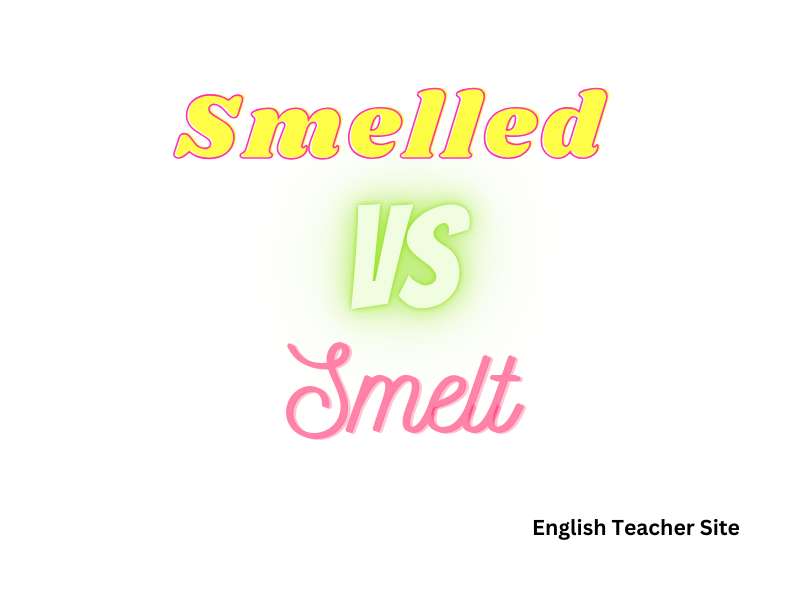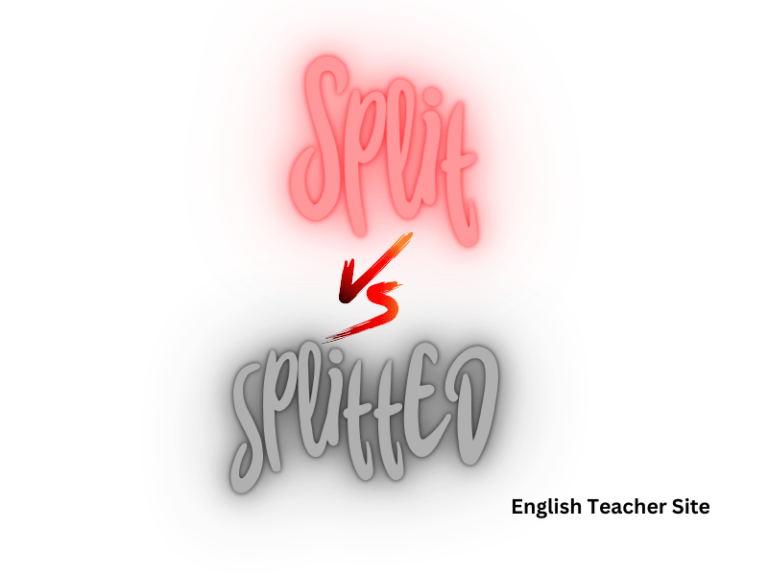Whats the Past Tense of Smell: Smelled vs. Smelt Explained

- Both “smelled” and “smelt” are correct past tense forms of the verb “smell,” with “smelled” being more common in American English and “smelt” in British English.
- The choice between “smelled” and “smelt” can affect the clarity of communication, depending on the audience’s familiarity with different dialects of English.
- Apart from being the past tense of “smell,” the word “smelt” also has distinct meanings unrelated to the sense of smell.
These variations in usage do not only reflect regional preferences but also signal subtle differences in the English language as it is spoken around the world. In addition to their role as the past tense of “smell,” “smelt” can refer to processes in metalworking or to a type of fish, further demonstrating the richness and complexity of English verb forms. It’s important for learners and proficient speakers alike to be aware of these differences to ensure clear and accurate communication.
What’s the Past Tense of Smell: Smelled or Smelt?
Smelled vs. Smelt Usage:
| American English | British English |
|---|---|
| smelled | smelled |
| smelt |
In American English, “smelled” is the standard past tense form. In contrast, British English commonly uses both “smelled” and “smelt” interchangeably. It is crucial, however, to maintain consistency within a piece of writing.
Factors Affecting Usage:
- Regionality: The choice may depend on whether the speaker or writer follows American or British English conventions.
- Consistency: Within a document, consistency in the use of either form is key to maintain clarity.
- Audience: The target audience’s familiarity with either form could influence the choice.
The distinction between “smelled” and “smelt” does not affect their meaning as both signify the past action of perceiving odor. It should be noted that “smelt” also has distinct meanings not related to smell, such as the process of melting and refining ore.
Takeaway Points:
- “Smelled” and “smelt” are both correct past tense forms of “smell.”
- “Smelled” is favored in American English.
- “Smelt” is also used in British English, alongside “smelled.”
- No difference in meaning exists between the two forms.
Verb Forms of Smell
In the simple past tense, ‘smell’ can become either smelled or smelt. Although both versions are correct, their usage often depends on the dialect of English being spoken:
- Smelled is predominantly used in American English.
- Smelt is commonly used in British, Australian, and other varieties of English.
The past participle is also either smelled or smelt, and it follows the same geographical distinctions as the simple past.
Simple Past Tense
| American English | British English |
|---|---|
| smelled | smelled/smelt |
Note: ‘Smelt’ is less common in American English but may appear in some dialects.
Past Participle Tense
| American English | British English |
|---|---|
| smelled | smelled/smelt |
When utilizing ‘smell’ in the present tense singular third-person, it becomes smells:
- The flower smells lovely.
In the present participle or gerund form, ‘smell’ becomes smelling, used for continuous tenses:
- She is smelling the spices.
Examples of ‘Smell’ Used in Sentences
‘Smell’ is an irregular verb, which means its past tense can be formed in irregular ways. In English, both ‘smelled’ and ‘smelt’ are acceptable past tense forms of ‘smell,’ with some regional preferences.
Simple Past Tense:
| Subject | Smelled | Smelt |
|---|---|---|
| I/He/She | I smelled the roses. | He smelt smoke in the hallway. |
| We/They | We smelled gas and called the emergency services. | They smelt something burning in the kitchen. |
Past Participle:
| Used with “have” | Smelled | Smelt |
|---|---|---|
| I/You/We/They | I have smelled the perfume before. | You have smelt this scent, haven’t you? |
| He/She/It | She has smelled trouble brewing. | It had smelt like rain all day. |
When constructing sentences, the context can determine which form to use. In American English, ‘smelled’ is predominantly used, while ‘smelt’ appears more often in British English. Both forms are grammatically correct, and the choice often depends on personal preference or regional norms.
Using ‘smell’ in a bullet list of examples:
- When I walked into the bakery, I smelled the sweet aroma of fresh pastries.
- They smelled the ocean breeze as they walked along the beach.
- After stirring the pot, she smelt the soup to check if it needed more seasoning.
- He hasn’t smelt the fragrance of lilies since that day in the garden.
Sentences should flow naturally using either ‘smelled’ or ‘smelt,’ without affecting the understandability of a narrative. No particular emphasis is placed on the action, merely that it happened in the past.
Examples of ‘Smelled’ Used in Sentences
In the realm of grammar, the past tense of “smell” garners attention due to its two possible forms. To illustrate the use of “smelled” as the past tense, consider the following examples, showcasing the term in various sentence structures.
Simple Past Tense:
- She smelled the aroma of fresh coffee in the morning air.
- The detective smelled a hint of perfume at the crime scene.
Past Continuous Tense:
- They were disappointed as the rain smelled like sulfur.
- While walking past the bakery, I smelled the sweet scent of pastries.
Here is a structured view of the verb “smelled” used in different contexts:
| Context | Sentence Example |
|---|---|
| Descriptive Action | He smelled the flowers carefully to identify the species. |
| Perceptive Experience | They smelled smoke before noticing the fire. |
The use of “smelled” integrates well within both an active setting, where the subject actively detects a scent, as well as a passive circumstance, where an odor is present without a direct action.
- Active: The dog smelled the ground for traces of its owner.
- Passive: A persistent odor of gasoline smelled strongly in the garage.
When employing “smelled” in writing, it is essential to ensure that the context is clear:
- Detective Fiction: The private eye smelled trouble ahead as he stepped into the dimly lit alley.
- Culinary Review: The critic smelled the spices in the curry to evaluate the chef’s skill level.
Examples of ‘Smelt’ Used in Sentences
The past tense of ‘smell’ can either be ‘smelled’ or ‘smelt’. He specifically focuses on the usage of ‘smelt’ to illustrate its application in various sentences. The word ‘smelt’ serves the same purpose as ‘smelled’ and is particularly common in British English, though it is also acceptable in other forms of English.
In sentences, ‘smelt’ can convey both the action of perceiving a scent and the state of emitting an odor. Here are some examples of ‘smelt’ in use:
Sentences Reflecting Action of Perceiving a Scent
| Sentence | Explanation |
|---|---|
| She smelt something burning and immediately called the fire department. | ‘Smelt’ indicates the action of detecting a scent. |
| They smelt the sea air as they walked along the beach. | It shows that the subject actively perceived the scent of the sea. |
Sentences Indicating the State of Emitting an Odor
| Sentence | Explanation |
|---|---|
| The cheese smelt overpowering. | ‘Smelt’ is used to describe the odor emitted by the cheese. |
| The old books in the library smelt musty. | Here, ‘smelt’ characterizes the scent that the books were giving off. |
- The flowers smelt wonderfully fresh. (The flowers emitted a fresh scent.)
- He smelt gas and hurried to turn off the stove. (He detected the scent of gas.)
These instances show the versatility of the word ‘smelt’ in different contexts. It’s important to note ‘smelt’ carries the same meaning as ‘smelled’, and the use of one over the other is often a matter of regional preference.
Origin of the Word ‘Smell’
The term smell carries with it centuries of historical etymology. Tracing back to its Old English roots, it originates from the word ‘smellan’, which later evolved into the Middle English ‘smellen’, bearing the meaning to emit or perceive an odor.
| Century | Term | Note |
|---|---|---|
| Old English | smellan | Initial form, meaning to emit or to perceive an odor. |
| Middle English | smellen | Transitioned form found in Middle English texts. |
Exploring its Germanic lineage reveals further connections. The Proto-Germanic root *smel- parallels Old High German ‘smellen’ and is akin to Dutch ‘smelten’ which means to melt—possibly linked to the way odors seem to melt into the air. Germanic languages often utilize similar roots emphasizing the sense’s pervasive nature.
- Kinship in Language:
- Dutch: smelten (to melt)
- German: schmelzen (to melt)
Linguistic studies highlight this as a common semantic field where the concepts of smelling and melting interconnect, due to the dispersal aspect of both actions. The transition from a word denoting a more physical melting to one focusing on the detection of scent illustrates how language evolves over time to encompass new meanings.
Sources
- Etymology online, origin of smell.
My name is Khamis Maiouf. I am the creator of the English Teacher Site, dedicated to providing valuable resources and insights for students around the world. With a passion for education and a commitment to helping students enhance their skills, I aim to make English teaching more effective and enjoyable for both educators and students.






